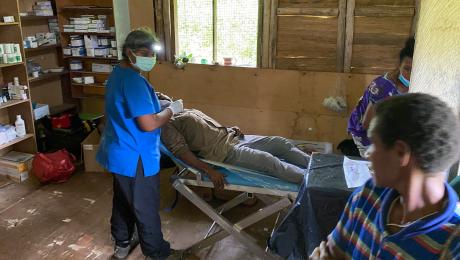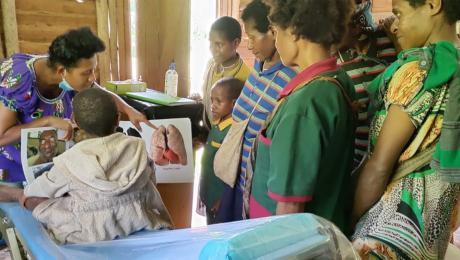
“Most students and adults were seeing a toothbrush and fluoride toothpaste for the very first time!” said Dr Camy Thomas after returning from the Malaumanda Health Patrol.
Dr Camy Thomas and her dental assistant Ms. Maeigi Gini did a school survey on dental hygiene as well as dental health awareness talks including brushing activities in the primary school, at various village places, and, of course, during patient consultations. Below, she shares her observations and reflections from the recent Malaumanda clinic patrol considering the traditional buai quid chewing practices and the nutrition changes, Dr Diana Zwijnenburg already shared HERE.
The facts
Screening and dental health check-ups were done and toothbrushing activities were conducted for 114 students aged between 4-18 years at the primary school and in the community.
22 of the 40 kids between age 4-12 had more than one decayed tooth and 50% of them had even their permanent molar decayed; whereas 23 of 73 teenage students had at least one decayed permanent tooth.
Treating the individual patient is important, but a much bigger impact is achieved by health education and prevention of sickness.
The point of interest is that more than 50% of kids aged 4-12 years have dental cavities. Ingestion of highly sugared lollies, chewing gum, sirup juice/epiyet, coke and consumption of chips and instant noodles with their salty spice sachets which are easily available in the stores as compared to previous consumption of garden food indicates changing food habits causing an alarming incidence of rising dental caries among young children. This is ominous to the lifestyle diseases like Diabetes, Hypertension and cardiovascular diseases which are bound to follow the young as they grow older.

The impact of betelnut and tobacco consumption
60 of the 73 school students aged between 12-18 years and 7 out of 40 students aged between 4- 2 years had already begun chewing betel quid. The deleterious effects were noticeable in some of the teens with the beginning of damage to the enamel, gums, and soft tissues of the oral cavity.
Buai (Betel quid) and hand-rolled tobacco smoking are extremely rampant in the area and it is affecting one generation after generation.
The older men and women in the community who are incessant betel quid chewers and smokers since their young age were also surveyed. Visible soft tissue changes indicative of pre-cancer lesions, multiple missing teeth, and severe gum disease leading to a mobility of the remaining teeth were recorded in the majority.
Many young men and women are also deeply addicted to the betel nut. Along with carcinogenic substances, the betel nut is highly addictive which makes it difficult for the habitual chewer to give up chewing. This leads to gum disease and eventually to early loss of multiple teeth and in turn, affects nutrition intake and general health of the individual. The combination of betel quid chewing, and tobacco smoking is a bane to the health of the young and old in the communities.
Many in the community grow their own tobacco plants and buai trees in their gardens and thus have a ready supply all the time. The kids grow up observing the habits of the older generation and are even at times initiated into inculcating the habits by the older population.

God's Word shared as a challenge
The verse that I include in my health talks vigorously is 1 Corinthians 6:12: ‘I have the right to do anything,’ you say—but not everything is beneficial. ‘I have the right to do anything—but I will not be mastered by anything.’
The need for oral hygiene
We also observed non-chewers and non-smokers in the population to have multiple missing teeth showing the need for Fluoride toothpaste and proper oral hygiene regimes as even consumption of garden food by itself without proper oral hygiene causes tooth decay, gum disease, and loss of teeth leading to a poorer intake of required nutrition.

